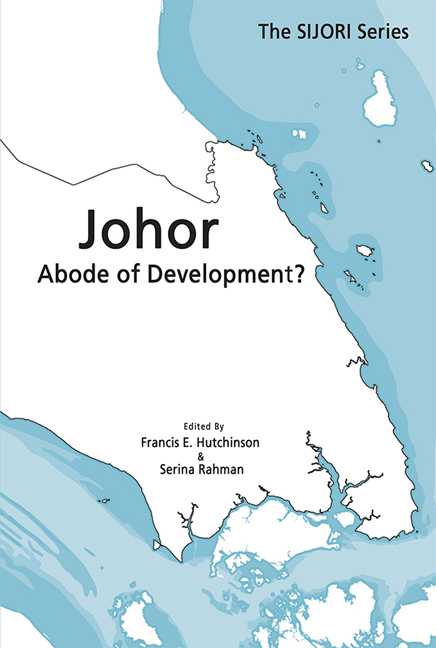3 - Johor’s Oil Palm Economy: Past, Present and Future
Published online by Cambridge University Press: 24 November 2020
Summary
INTRODUCTION
Introduced over a century ago, oil palms are currently Johor's most significant agricultural offering. Over one-third of Johor's entire landmass is planted with oil palms. Thirty per cent of these lands are farmed by independent smallholders, nearly twice the national average (MPOB n.d.-a; MAMPU n.d.). Further downstream, Johor's millers produced one-sixth of Malaysia's crude palm oil in 2018, worth nearly RM7 billion in revenue (MPOB n.d.-b). The territory hosts numerous downstream players pumping out refined palm oil, margarine, specialty fats, oleochemicals, and biodiesel. Johor's two major ports—Pasir Gudang and Tanjung Pelepas—anchor these production clusters, while also exporting RM15.5 billion of vegetable (mostly palm) oil products in 2017—an impressive 28 per cent of Malaysia's world-leading output (DOSM n.d.). Much of this global prominence stems from Johor's long history as an agricultural powerhouse, its forays into resource-based industrialization, and its relative success in becoming a trade hub for edible oils and chemical derivatives.
This essay will survey the oil palm's increasingly heavy presence within Johor's landscape, commerce, and political economy, grounding discussions in broader global and historical contexts where necessary. The paper's next section outlines the oil palm's importance to world trade, the crop's social and environmental complications in Southeast Asia, and the significance of independent smallholder farming arrangements. We then present a brief history of Johor's multilayered oil palm farm sector since its inception. A third section tracks the oil palm's journey through the value chain, mapping out the millers, crushers, refiners, merchants and equipment manufacturers that have consolidated Johor's status as an attractive locale for commodity processing. Having outlined the main commercial players involved, we then turn towards the more political dimensions of Johor's oil palm sector: the electoral significance of Johor's Federal Land Development Authority (FELDA) settler communities, other government-linked entities involved in oil palms, and land control issues, the latter especially dependent on close ties with Johor's state government. Land use concerns also connect with our final section, which looks at how urbanization, landowners and sustainability requirements are influencing the oil palm's future in Johor.
- Type
- Chapter
- Information
- JohorAbode of Development?, pp. 73 - 106Publisher: ISEAS–Yusof Ishak InstitutePrint publication year: 2020



